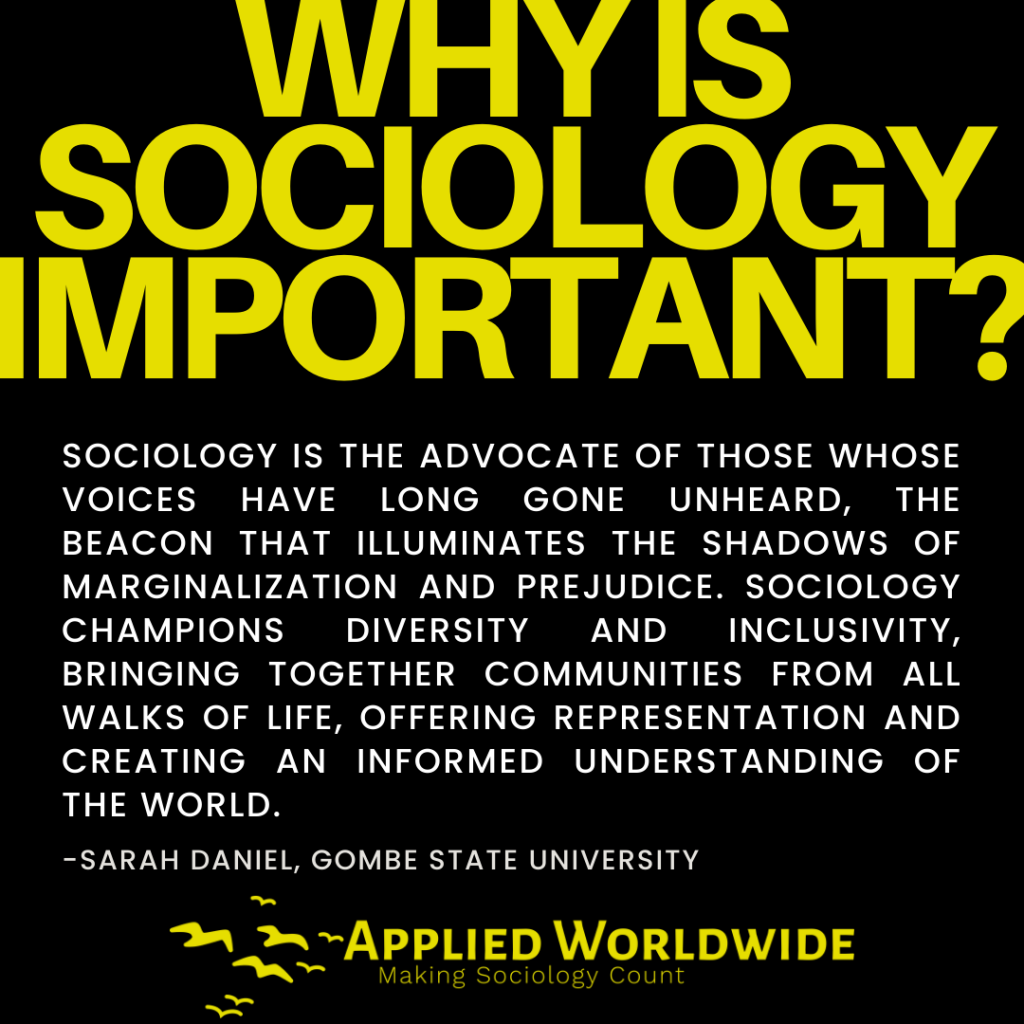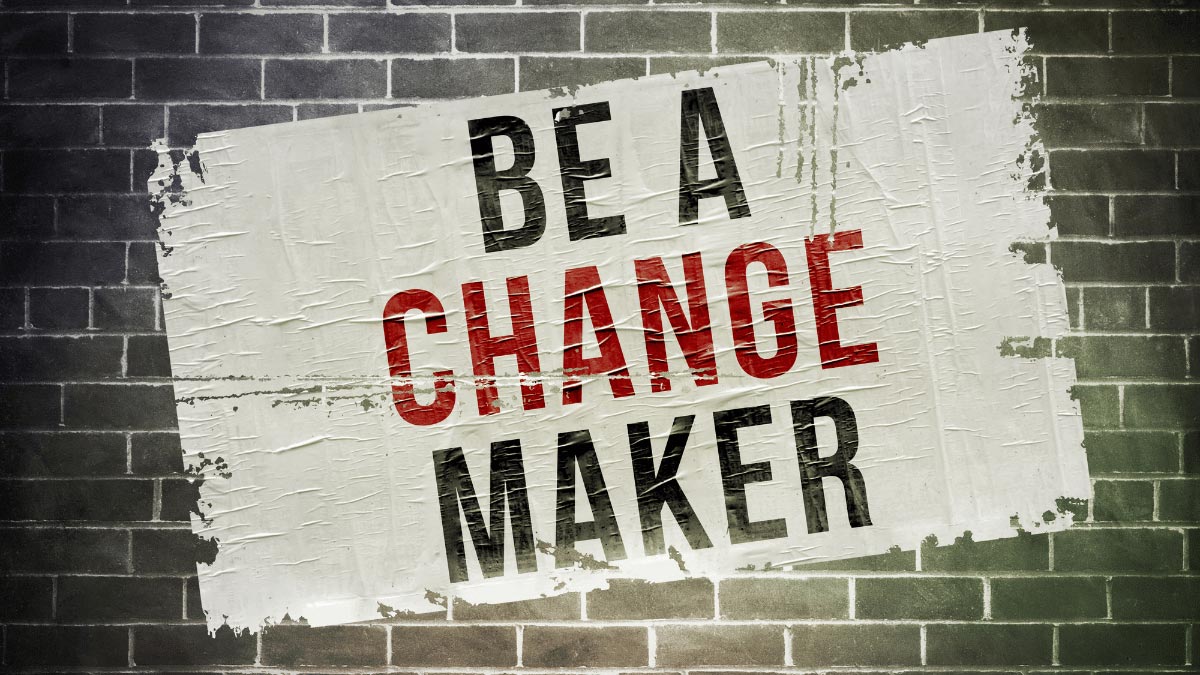Editorial Note
Thank you to our generous sponsors, Sociologists for Women in Society, Center for Equity Education, Azama Development Foundation, and Sociological Practice & Public Sociology (SPPS) – American Sociological Association (ASA) for helping us make Applied Worldwide’s 2023 “Why is Sociology Important?” student essay competition a success!
This essay on the importance of sociology was published on behalf of Applied Worldwide’s 2023 Global Student Essay Competition. For the 2023 competition, we awarded 16 student essayists across eight countries and one US territory and will be sharing each winning essay in our “Why is Sociology Important?” essay collection.
This sociology essay was written by Sarah Daniel, a second year undergraduate student of law at Gombe State University in Nigeria and earned a 3rd place prize in the competition.
Why is Sociology Important? Driving Positive Change, Sarah Daniel
Introduction
According to the American Sociological Association (ASA), sociology is “the study of human social behavior, relationships, and institutions.” It is a multi-faceted discipline that encompasses various topics such as social inequality, crime and deviance, culture, politics, and education. Sociology as an academic discipline is a field of study that studies human societies and social behavior, including group interaction, social structure, culture, and organization. It seeks to investigate the nature and dynamics of social relationships, explore the diversity of human experiences, and examine how social processes shape the world we live in. Sociology provides valuable insights into social issues, such as inequality, poverty, and discrimination, and aims to promote social change and improve social conditions.
Why is sociology important?
A frequently asked question in any subject taught in schools is “how will this help me in life?” The question of usefulness is a question that confronts every field of study and sociology is not an exception. A considerable number of students find the study of sociology fascinating but just have a hard time comprehending how it is something we can apply to everyday life. When examined closely it is easy to see how sociology is truly something we can apply to everyday lives and is indeed a science that contributes to the betterment of the world. It is a vast and multi-branched field that covers a wide range of topics, including social inequality, race and ethnicity, gender and sexuality, socialization, culture, globalization, social institutions, and social change. Sociology plays an important role in our everyday lives in many different ways.
Sociology helps us to understand the social world around us by examining social issues and problems, such as poverty, inequality, crime, and discrimination. According to a study by William Julius Wilson, in his book “The Truly Disadvantaged,” sociology has been important in explaining the causes of urban poverty, especially in relation to race, gender, and social class. Sociological studies have also identified social factors that influence health behaviors, including socio-economic status, gender, education, and race, among others. The identification of these factors can inform policymakers and promote the implementation of effective public policies to address social issues.
The importance of sociology lies in its ability to enhance our knowledge of social life and offer practical solutions to complex social problems. Sociologists use scientific methodologies to gather data, analyse social patterns, and develop theories that help explain social phenomena. Its theoretical perspectives and research methods enable us to analyse and interpret social phenomena from different lenses, such as structural-functionalism, conflict theory, symbolic interactionism, postmodernism, and feminism. This scientific approach allows us to identify relationships between social variables that contribute to social problems, such as economic inequality, racism, and sexism.
Sociology is fundamental to our understanding of human society and how it operates. It offers a unique perspective on how individuals, families, and communities work together to create social structures that govern our individual and collective behavior. Sociology’s role in shaping our understanding of social life has contributed significantly to our thinking on social research and the development of social theory. For instance, the works of prominent sociologists such as Emile Durkheim, Max Weber, Karl Marx, and George Simmel have all contributed significantly to our understanding of social relationships, social structures and institutions, and social change. By studying these issues, sociologists can provide solutions to these problems that are grounded in empirical evidence, rather than speculation or myth.
How sociology brings value to our immediate environment and the world around us
Sociology is a treasure trove, uncovering the intricacies of society and the challenges plaguing its people. The scope of its value extends beyond the textbooks and the classroom. It’s reach tugs at the strings of communities from far and wide. Sociology is the advocate of those whose voices have long gone unheard, the beacon that illuminates the shadows of marginalization and prejudice. Sociology champions diversity and inclusivity, bringing together communities from all walks of life, offering representation and creating an informed understanding of the world.

Nigeria, a country with a population of over 200 million people is Africa’s most populous country and its largest democracy. With more than 300 ethnic groups and over 500 languages, and many distinct religious and regional differences, its one of the world’s most culturally diverse countries. To foster unity amidst diverse ethnic groups and religious persuasions in Nigeria, sociology provides a significant toolset. It offers valuable insight into the unique challenges and perspectives of each community, providing empathy and understanding. By amplifying the voices of marginalised groups, sociology opens a gateway for inclusive dialogue, recognition, and equitable representation. In short, sociology offers an avenue for Nigerians to uphold their cultural and religious values whilst embracing diversity and promoting social harmony and tolerance.
Sociology plays a fundamental role in my community by helping individuals to understand the complex social dynamics that affect their lives. The discipline examines the social, cultural, and economic factors that impact social relationships and offer insight into how these factors can be addressed. Sociologists can analyse the impact of social determinants such as education, income, and social status on health. Understanding these factors can help residents to make informed decisions about their lives and the best strategies to improve their situation.
Sociology also provides a space for dialogue and exchange of information among members of communities. Through social networking platforms, community centers, and online forums, sociological insights can be shared for developing deeper levels of understanding and appreciation across cultures, social classes, and religions. This help promote social cohesion among community members and establish stronger relationships that can empower residents to take collective action.
Sociology empowers community members to be involved in social and political processes by recognizing their rights and ensuring representation. Through research on various societal groups like vulnerable children, women, the elderly, and the disabled, sociology can provide insight into their unique challenges, increase awareness and promote policy and programmatic interventions to bring social justice to those people. Andersen & Collins, rightly affirmed in their book, “Race, Class, and Gender,” that sociology can help young people understand how their daily interactions and experiences could positively or negatively influence their lives. In Nigeria, this could be used to promote the incorporation of perspectives of all community members in decision-making, ensuring that the voices of marginalized groups are heard.
How sociology makes a valuable difference in different professional sectors
Education is one of the most critical areas where sociology makes a substantial difference. Sociology provides valuable insights into how different social factors, such as race, class, and gender, can affect educational attainment and achievement of students. It can help educators understand how social inequalities and institutional barriers can impede access to quality education for students from different backgrounds. By incorporating sociological perspectives into teaching practices, educators can provide a more inclusive and equitable learning environment for their students.
Understanding the sociology of children from low-income families as well as those living in rural communities in Nigeria presents a ray of hope in addressing the social inequalities ravaging access to education. It provides the platform for a structured approach to analysing the structural and systemic barriers that limit children’s access to quality education thereby promoting equitable and inclusive educational opportunities for all Nigerians from different social backgrounds. It also serves as a tool for promoting and encouraging girl child education in Nigeria.
In the healthcare sector, sociology can help to better understand the social factors that impact individual health and well-being. Medical sociologists use sociological theories and concepts to analyse the social aspects of health and illness. They explore how social inequalities affect access to healthcare services, health outcomes, and patient experiences. By understanding these sociological factors, healthcare professionals can create more effective interventions and policies to improve patient outcomes and reduce health disparities.
Furthermore, sociology also makes a valuable difference in law enforcement. Sociological theories can help police departments understand how systemic inequalities and social factors impact crime rates, police-community relations, and public perceptions. Sociologists can also work alongside police departments to provide cultural sensitivity training, promote community engagement, and develop policies and practices that improve policing practices. Similarly, sociology can contribute to judicial processes, helping lawyers and judges to better understand the social contexts and factors surrounding crime and criminal behavior.
In the public policy sector, sociology plays an important role in shaping public policy decisions. Sociologists can provide data-driven insights into social issues and design programs and policies that address these issues effectively. Sociological perspectives help policymakers understand the impact of policies on different social groups and promote policies that promote social justice and equity.
Sociology has the potential to make a valuable difference in various professional sectors. It provides insights into how different social factors affect individual and group behavior, as well as how social structures and institutions operate in society. By integrating sociological perspectives into professional practice, educators, healthcare professionals, law enforcement agencies, and policymakers can better understand social dynamics and design practices and policies that promote social justice, equity, and inclusion.
How do sociological theories and research methods help drive positive change in the world?
Sociological theories and research methods are instrumental in driving positive change in the world around us. These theories help identify the root causes of social issues and suggest potential solutions. When combined, sociological research methods and theories help us to develop more evidence-based, effective policies and interventions, as well as create a more comprehensive understanding of social phenomena.
One way sociological theories can bring positive change is by providing insights into how social structures and systems operate, which can help us to identify and address social inequalities. For example, feminist theory provides an understanding of how gender operates within social structures and how it creates inequality and power imbalances. Utilizing this theory allows us to recognize and confront various forms of gender inequality in society, such as the gender pay gap or the underrepresentation of women in positions of power. Applying theories like these to issues like poverty, mental health, and crime can lead to solutions that target the root cause instead of just the symptoms.
Sociological research methods provide ways of collecting empirical data and testing theories to identify potential solutions to social issues. For instance, qualitative research methods such as interviews, focus groups, and ethnography helps us to gain a deeper understanding of people’s experiences and how they relate to social structures and systems. Quantitative research methods such as surveys, experiments, and statistical analysis can help us to identify patterns and trends across large data sets, ultimately helping us to identify solutions to social problems. Sociological research can also provide evidence for developing policies in areas like education, immigration, and healthcare.
Sociological theories can help drive positive change by promoting social awareness and action. Theories such as conflict theory and critical race theory highlight the various forms of oppression and inequality present in society. By raising awareness and promoting social consciousness, sociological theories can motivate people to challenge and transform oppressive social structures and systems.
The application of sociological theories and research methods brings about positive change in society through multiple means. It helps us identify the root cause of social issues, provide insights to support evidence-based policy-making, and promote social awareness that leads to action. As a result, sociological theories and research methods must be utilized to help promote social change and create a society of our dreams
Conclusion
Sociology serves as a vital and precious field of study. It provides us with the tools to comprehend how our society functions whilst also paving the way for progression. With its scientific inquiry, it reveals the underlying patterns that dictate our social relations, highlighting where social inequities lie. Its impact spans far and wide, shaping policies, research, pedagogy, and even business operations. These contributions serve as a crucial catalyst for social justice, equality, and transformation. By adding to our collective insight into social existence, the work of sociologists has the potential to make a positive difference in our world.
References
- American sociological Association (2019). What is sociology? Retrieved from https://www.asanet.org/about-asa-/asa story/what-is-sociology
- Andersen, M. L., & Taylor, H. F. (2019). Sociology: The essentials. Cengage Learning.
- William Julius Wilson (2012). The truly disadvantaged.
Meet our 2023 Global Student Essay Competition Sponsors!

Sociologists for Women in Society is a nonprofit professional feminist organization dedicated to:
- Encouraging the development of sociological feminist theory and scholarship
- Transforming the academy through feminist leadership, career development, and institutional diversity
- Promoting social justice through local, national, and international activism
- Supporting the publication and dissemination of cutting edge feminist social science

The Center for Equity Education is a 501c3 nonprofit dedicated to providing quality and affordable DEI&A, discrimination, harassment, and sexual harassment prevention and education services.

Azama Development Foundation is a Non-governmental organization that actively works towards the development of youths and women to be self-reliant and productive. Our mission is to transform the lives of youths and women from all over Africa to be self-reliant and productive actively contributing to national economy, education and development, thereby eradicating poverty, illiteracy and lack of enlightenment in the region.

Sociological Practice & Public Sociology (SPPS) promotes the use of sociology to inform research, practice, and public policy beyond academia. In short, we focus on Making Sociology Actionable. SPPS focuses on public and applied sociology as a section under the American Sociological Association (ASA).







